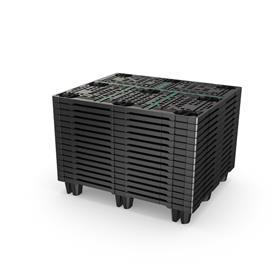
A new lightweight plastic pallet with the potential to make the fresh produce supply chain more sustainable has been trialled by global packaging firm Polymer Logistics in conjunction with Asda.
The recent trial, involving Lincolnshire brassica supplier D.E. Brand, tested Polymer Logistics’ Cleanpal pallet, which is said tooffers several benefits over timber pallets.
“Vastly improved pallet life, along with fewer delivery and return miles, combine to offer essential sustainability gains,” the company said.
“At just 15kg, it provides ease of manual handling, making it a much more ergonomically friendly solution than wood. Also, the lighter pallet means that more capacity is available for product before weighing out a load.”
On average, three to six per cent more merchandise can be loaded onto a vehicle with Cleanpal than with wood pallets, Polymer Logistics claimed, meaning fewer miles are required to ship the same amount of product.
Another plus is the durability of the pallets, which experience a damage rate of just 1.5 per cent per trip compared to more than 25 per cent for wood pallets, according to the packaging specialist.
This increased life expectancy has the potential to make the supply chain more reliable by minimising delays, disruptions or product damage due to breakage.
In addition, the pallets could make the supply chain more transparent since they can be tracked using Radio-Frequency Identification (RFID) chips.
In the trial Cleanpal pallets were used for field palletisation and shipment of broccoli and cabbage to Asda central distribution centres in Skelmersdale, West Lancashire and Lutterworth in Leicestershire.
Several variables were evaluated, including the productivity of forklift handling during loading and unloading; load stability in conjunction with plastic crates; and Cleanpal’s suitability for manual handling.
The project allowed material handlers to see how the plastic pallets can be lifted and stacked manually, and nested when empty to use space more effectively in transport and storage.
“The Cleanpal trial proved to be highly successful,” Polymer Logistics reported. “Harvest workers enjoyed the ease of pallet handling in the field, with no change required for pallet strapping requirements.
“There was absolutely no shifting or loss of palletised product in transit as load stability was enhanced by the use of interlocking trays. Because trays do not overhang the pallet, pallets of product are faster to manoeuvre and are less vulnerable to damage.'
Staff at Asda Skelmersdale added that the pallets were easily handled by forklifts and pump trucks, as well as being lighter to lift and stack.



